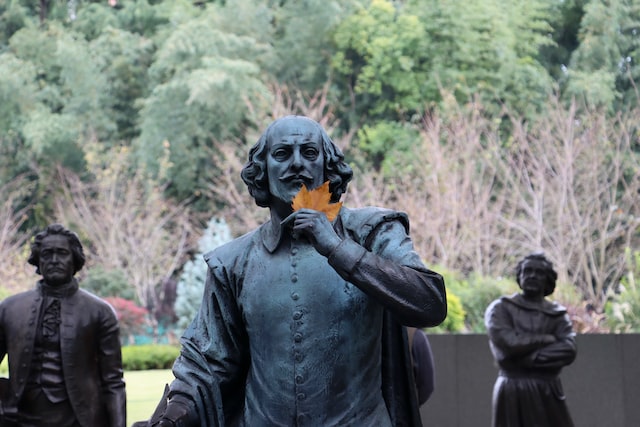

If We Shadows Have Offended
“If we shadows have offended,
Think but this, and all is mended,
That you have but slumbered here
While these visions did appear.
And this weak and idle theme,
No more yielding but a dream,
Gentles, do not reprehend:
If you pardon, we will mend:
And, as I am an honest Puck,
If we have unearned luck
Now to ‘scape the serpent’s tongue,
We will make amends ere long;
Else the Puck a liar call;
So, good night unto you all.
Give me your hands, if we be friends,
And Robin shall restore amends.”
― William Shakespeare, A Midsummer Night’s Dream
When Shakespeare wrote these famous lines years ago as the final words of his comedic masterpiece, A Midsummer Night’s Dream, he was using them as a direct refutation of the complaints espoused by the aristocracy towards his works of dramatic fiction. Mouthed by the capricious and whimsical Puck, the sly and clever imp who deliberately creates much of the mischief that serves as the catalyst for the play’s interwoven plot lines, they are intended to be a light and playful retort to the more serious commentary from nobles that threatened Shakespeare’s vocation and the theater in general. It seems that nobility was not overly fond of having commoners portray their like on stage, feeling that doing so suggested a very thin line between real-life aristocracy and those from the realm of make-believe. Indeed, the elite of Shakespeare’s time probably had reason for concern as the theater did, in fact, play a s significant role in advancing the erosion of the social class system and moving British society further in the direction of meritocracy. But Shakespeare in this famous epilogue was telling them not to fear, to just chill out and relax, man. Don’t get offended, he was suggesting. It is, after all, just a play, a dream, if you will, and how offended should we get at that?
We might take a valuable lesson from those words Shakespeare penned over six-hundred years ago. We have, in recent years, become a culture of the perpetually offended, finding ways that we have been marginalized and repressed in each and every comment we hear. And in so doing, we have lost not only our ability to grow from potential constructive criticism but our sense of humor as well.
We become offended by every joke comedians tell. We get offended by which actors get which parts, particularly when a minority character or one who is LGBTQ is portrayed by someone who does not meet those particular characteristics. We get offended by off-hand remarks made my some person we have a vague association with on Twitter. We get offended by the biographical details of historical figures who have long-since passed. We get offended by television shows, books and movies that are the by-product of a bygone era. But jokes are just jokes. And acting is people playing roles that are intentionally not themselves. And social media is just a bunch of idiots invoking free speech and saying stupid things in an unrestricted public forum. And dead people are, well, dead. And we cannot change the past someone or something else may have been a part of, but we can change the future. And maybe we should focus our efforts and outrage on that.
The state of being offended is inherently a state of negativity, but it is also a state to which we choose to subject ourselves. It is a perspective we opt into, not an intrinsic aspect of the human condition or the extrinsic environment which surround us. We get to decide if we are going to allow something someone else says or does ruffle our feathers. The natural state of human beings is one of contentment as we recline back into our self-contained bubbles of existence. But as we venture out into the world, both literally and metaphorically, we encounter the thoughts, actions, and opinions of others, and we react to them accordingly. But how you react, both in terms of your outward manifestations as well as your inner psyche, are determined by you. Oh you can run around screaming your insipid head off, like Chicken Little on a particularly gloomy Monday morning, claiming that the it is the external stimuli that has mandated your response, but make no mistake- you and only you determine what that response will be. You have the capacity to either allow yourself to go on some sort of epic rager or to just shrug it off as willful ignorance and move on. I would highly suggest a whole lot more of the latter.
Yes, of course there are issues which we should get worked up about. There are true injustices and slights out there that have real-life consequences, and for these, we should be willing to take a stand. But far too often these days, we are getting our panties in a bunch about stuff that doesn’t really matter. Who cares that the Muppets let Johnny Cash sing in front of a Confederate flag in 1977? Do you really think kids are going to bring back slavery because of it? Who cares if James Franco is going to play Fidel Castro even though he is not himself Cuban? That is, after all, why they call it “acting”. Who cares that Dave Chappelle made a few jokes that involved the trans community? He’s just a comedian. I can completely understand if you find what he has to say to be disparaging, but if you don’t like his humor, just don’t watch him. Recognize that he is simply airing an opinion and leave your state of offense for shit that really matters.
Awhile back, author Mark Manson taught us about the subtle art of not giving a fuck, of only investing ourselves and our mental energy in the few places where it really matters. His point wasn’t to suggest that we should stop caring altogether, but rather that we should be more mindful about where we invest our time and energy. We have gotten to a point where we are so consistently on high-alert for any possible offense that we forget to notice and appreciate all the remarkable actions that surround us. Focus more of your energy on gratitude and less on being offended, and you just might find yourself a whole lot happier and a whole lot less pissed off.
Steven Craig is the author of the best-selling novel WAITING FOR TODAY, as well as numerous published poems, short stories, and dramatic works. Read his blog TRUTH: In 1000 Words or Less every THURSDAY at www.waitingfortoday.com



